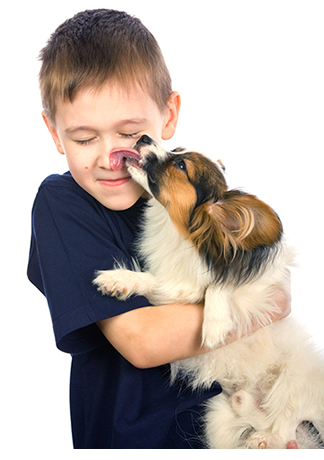What are zoonotic diseases?
Zoonotic diseases or ‘Zoonoses’ are animal diseases that can be transmitted to humans.
Our pets are cute, fluffy, and adorable. Cuddling them as often as possible is irresistible, so keeping our pets healthy is an important part of keeping ourselves and our families healthy too.
What every pet owner should know
Although the risk of contracting a zoonotic infection is low, the consequences of infection with zoonotic diseases cannot be ignored.
Types of zoonotic diseases
Worms
Intestinal parasites like roundworms, hookworms, and tapeworms that infect dogs, cats, and other domestic pets can be transmitted to people. Intestinal worming of pets is very effective in preventing the spread of worms to humans.
Here are some tips to prevent worms:
- worm adult cats and dogs every three months and puppies or kittens every two weeks to one month (for a worming regime to suit your pet’s life stage, please ask our healthcare team for more information)
- take your pet for regular veterinary health check-ups.
- do not feed your pet uncooked offal
- prevent pets from wandering and scavenging
Ringworm
Ringworm is a type of fungal infection that infects both animals and humans. Similar to tinea, ringworm causes the skin to itch and sting. Humans can come into contact with ringworm via an animal or directly from soil.
Giardia
Giardia is a parasite that lives in the intestine of infected humans or animals and their immediate environment. Giardia causes diarrhoea and intestinal problems.
Sarcoptes
Sarcoptes are parasitic mites that burrow beneath the skin causing irritation and itching. The infection caused by Sarcoptes is known as ‘Sarcoptic Mange’. When a human comes into contact with an affected animal, they can become infected with these mites. Minimal handling of affected pets and immediate treatment is the best way to prevent the transmission of these parasites.
Cat Scratch Disease (CSD)
Cat Scratch Disease, also known as Cat Scratch Fever, is a bacterial infection which causes fever, fatigue, and swollen lymph nodes. It is transmitted to humans by cat scratches and bites. Prevent CSD by discouraging your cat from scratching and biting you. Avoid rough play, keep your cat’s nails trimmed, never allow a cat to lick open wounds on your body, and wash all bites and scratches with soap and water. Always wash your hands after touching, playing with or caring for your pet.
Toxoplasmosis
Toxoplasmosis is an infection caused by the parasite ‘Toxoplasma Gondii’, which is found in animal faeces. It is most commonly found in feline faeces. Toxoplasmosis is a protozoan infection that may seriously harm people with compromised immune systems, and pregnant women and their unborn child. Cats can become infected by killing and eating infected prey or consuming raw and undercooked meat. Parasites are transmitted to humans most commonly through coming into contact with the stools of infected pets.
Tips for a healthy family:
- bathe/groom your pet regularly
- keep your pet’s environment, including bedding, clean
- dispose of your pet’s faeces promptly
- encourage good hygiene in children from a young age by making them wash their hands regularly, especially before eating and after handling pets or toys
- always wash children’s hands after playing in dirt or sandpits
- wear gloves when gardening and always wash your hands thoroughly afterward
- if you are pregnant, ask another family member to change the cat’s litter box, and do not handle unfamiliar cats
- if you are pregnant, feed your cat a canned or dried commercial cat food instead of raw meat
A final note…
Pets are beneficial for our mental and physical health. Their companionship teamed with the encouragement of more physical activity means the pros of pet ownership far outweigh the cons. Zoonotic diseases can be prevented by regular worming and by following good hygiene practices. By adopting the recommendations in this article, family and pets will enjoy a healthy and happy life together. Speak to your local Greencross Vets team if you are concerned about how to prevent zoonoses in your home.

 Greencross Vets
Greencross Vets 









